Analyzing the multifaceted impacts of tourism on society and economy
VerifiedAdded on 2022/10/31
|8
|2626
|24
Essay
AI Summary
This essay delves into the multifaceted impacts of tourism, examining its economic, social, and environmental effects. It begins with an introduction to tourism, highlighting its post-pandemic popularity and the concept of equality in sustainable tourism. The essay explores contemporary tourism, discussing technological advancements, economic benefits like infrastructure development, and income generation. It then analyzes the positive impacts, such as revenue generation, employment opportunities, and cultural preservation, as well as negative impacts, including resource depletion and social changes. The conclusion summarizes the benefits and drawbacks of tourism, emphasizing its importance for a country's GDP and future opportunities, including e-tourism and technological advancements. The essay references various sources to support its arguments, providing a comprehensive overview of the tourism industry's complex and evolving nature.
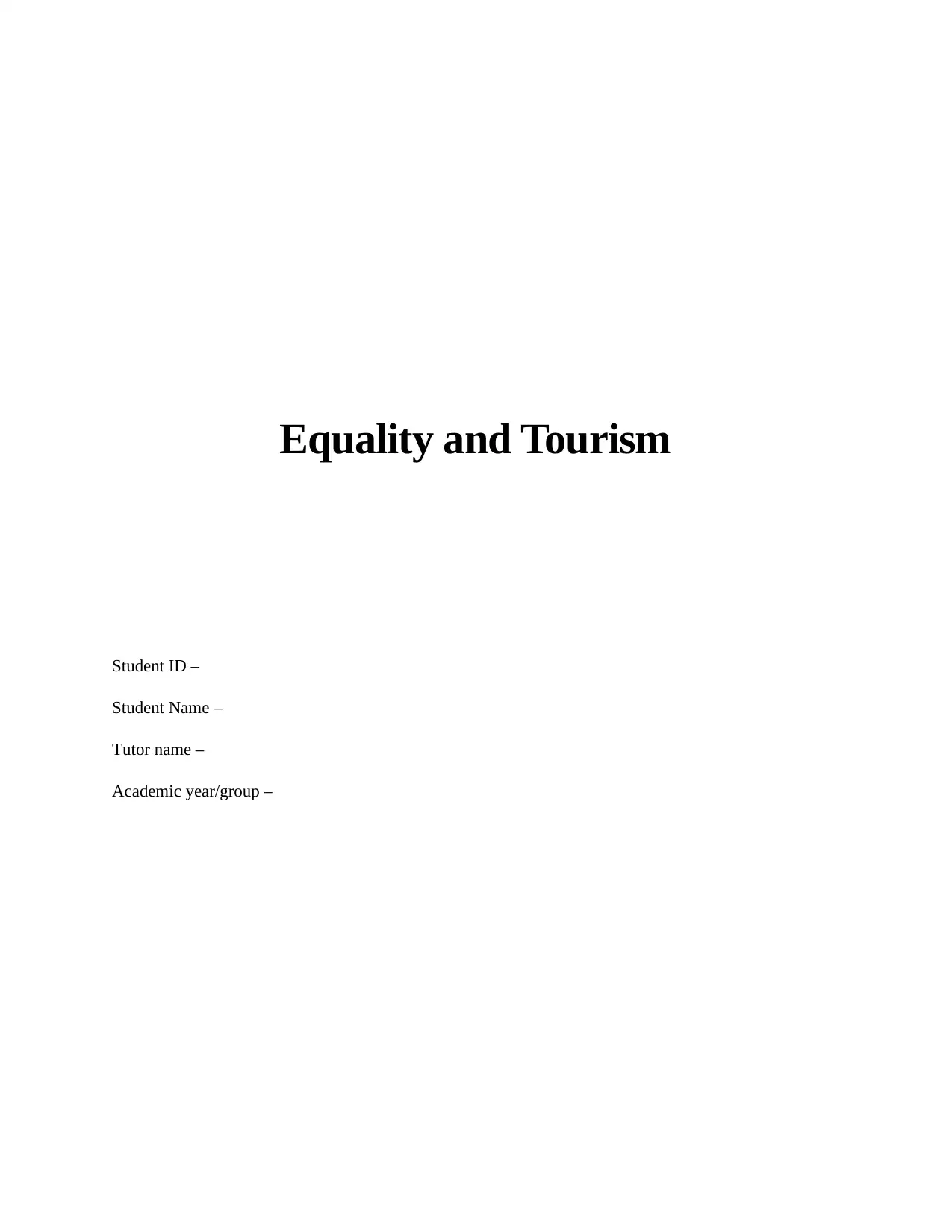
Equality and Tourism
Student ID –
Student Name –
Tutor name –
Academic year/group –
Student ID –
Student Name –
Tutor name –
Academic year/group –
Paraphrase This Document
Need a fresh take? Get an instant paraphrase of this document with our AI Paraphraser
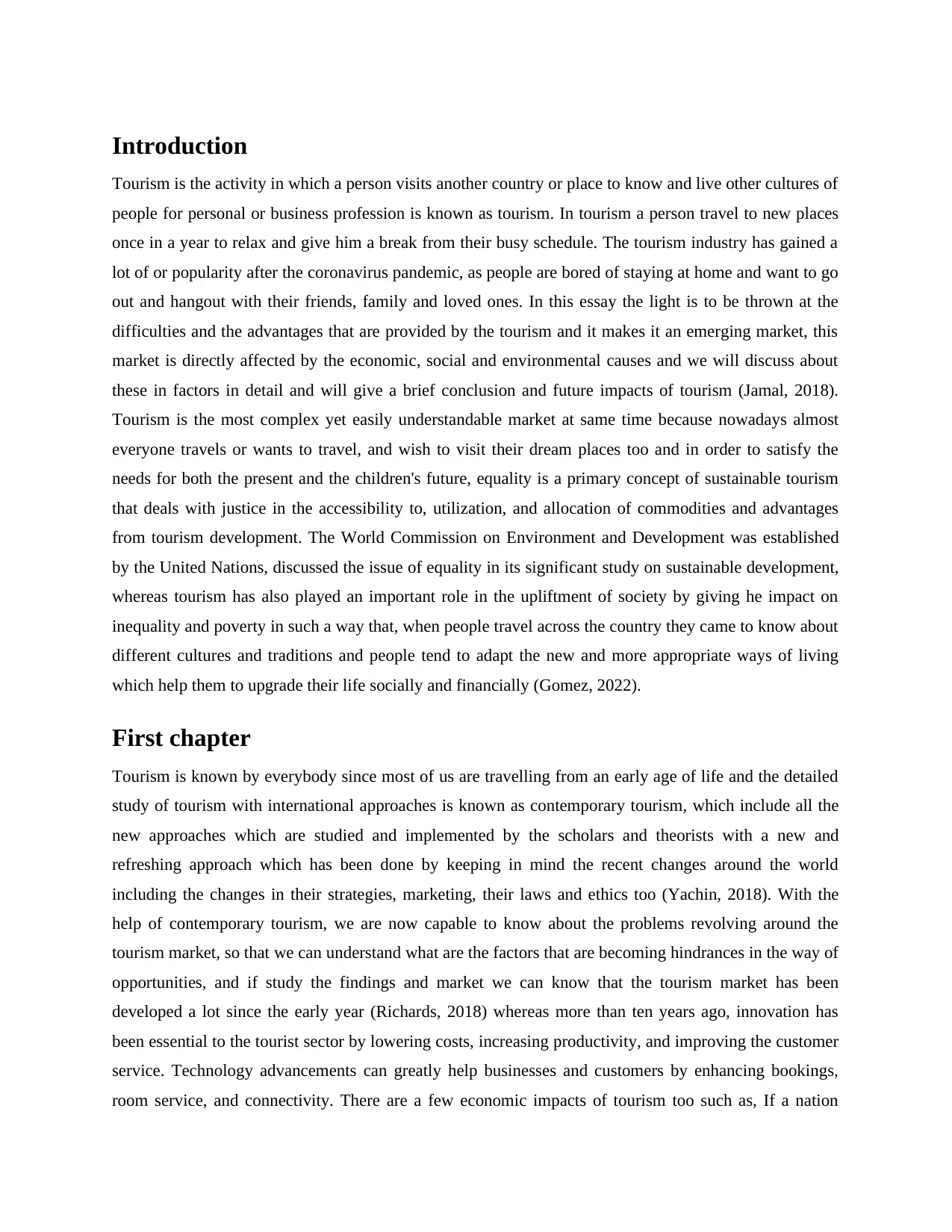
Introduction
Tourism is the activity in which a person visits another country or place to know and live other cultures of
people for personal or business profession is known as tourism. In tourism a person travel to new places
once in a year to relax and give him a break from their busy schedule. The tourism industry has gained a
lot of or popularity after the coronavirus pandemic, as people are bored of staying at home and want to go
out and hangout with their friends, family and loved ones. In this essay the light is to be thrown at the
difficulties and the advantages that are provided by the tourism and it makes it an emerging market, this
market is directly affected by the economic, social and environmental causes and we will discuss about
these in factors in detail and will give a brief conclusion and future impacts of tourism (Jamal, 2018).
Tourism is the most complex yet easily understandable market at same time because nowadays almost
everyone travels or wants to travel, and wish to visit their dream places too and in order to satisfy the
needs for both the present and the children's future, equality is a primary concept of sustainable tourism
that deals with justice in the accessibility to, utilization, and allocation of commodities and advantages
from tourism development. The World Commission on Environment and Development was established
by the United Nations, discussed the issue of equality in its significant study on sustainable development,
whereas tourism has also played an important role in the upliftment of society by giving he impact on
inequality and poverty in such a way that, when people travel across the country they came to know about
different cultures and traditions and people tend to adapt the new and more appropriate ways of living
which help them to upgrade their life socially and financially (Gomez, 2022).
First chapter
Tourism is known by everybody since most of us are travelling from an early age of life and the detailed
study of tourism with international approaches is known as contemporary tourism, which include all the
new approaches which are studied and implemented by the scholars and theorists with a new and
refreshing approach which has been done by keeping in mind the recent changes around the world
including the changes in their strategies, marketing, their laws and ethics too (Yachin, 2018). With the
help of contemporary tourism, we are now capable to know about the problems revolving around the
tourism market, so that we can understand what are the factors that are becoming hindrances in the way of
opportunities, and if study the findings and market we can know that the tourism market has been
developed a lot since the early year (Richards, 2018) whereas more than ten years ago, innovation has
been essential to the tourist sector by lowering costs, increasing productivity, and improving the customer
service. Technology advancements can greatly help businesses and customers by enhancing bookings,
room service, and connectivity. There are a few economic impacts of tourism too such as, If a nation
Tourism is the activity in which a person visits another country or place to know and live other cultures of
people for personal or business profession is known as tourism. In tourism a person travel to new places
once in a year to relax and give him a break from their busy schedule. The tourism industry has gained a
lot of or popularity after the coronavirus pandemic, as people are bored of staying at home and want to go
out and hangout with their friends, family and loved ones. In this essay the light is to be thrown at the
difficulties and the advantages that are provided by the tourism and it makes it an emerging market, this
market is directly affected by the economic, social and environmental causes and we will discuss about
these in factors in detail and will give a brief conclusion and future impacts of tourism (Jamal, 2018).
Tourism is the most complex yet easily understandable market at same time because nowadays almost
everyone travels or wants to travel, and wish to visit their dream places too and in order to satisfy the
needs for both the present and the children's future, equality is a primary concept of sustainable tourism
that deals with justice in the accessibility to, utilization, and allocation of commodities and advantages
from tourism development. The World Commission on Environment and Development was established
by the United Nations, discussed the issue of equality in its significant study on sustainable development,
whereas tourism has also played an important role in the upliftment of society by giving he impact on
inequality and poverty in such a way that, when people travel across the country they came to know about
different cultures and traditions and people tend to adapt the new and more appropriate ways of living
which help them to upgrade their life socially and financially (Gomez, 2022).
First chapter
Tourism is known by everybody since most of us are travelling from an early age of life and the detailed
study of tourism with international approaches is known as contemporary tourism, which include all the
new approaches which are studied and implemented by the scholars and theorists with a new and
refreshing approach which has been done by keeping in mind the recent changes around the world
including the changes in their strategies, marketing, their laws and ethics too (Yachin, 2018). With the
help of contemporary tourism, we are now capable to know about the problems revolving around the
tourism market, so that we can understand what are the factors that are becoming hindrances in the way of
opportunities, and if study the findings and market we can know that the tourism market has been
developed a lot since the early year (Richards, 2018) whereas more than ten years ago, innovation has
been essential to the tourist sector by lowering costs, increasing productivity, and improving the customer
service. Technology advancements can greatly help businesses and customers by enhancing bookings,
room service, and connectivity. There are a few economic impacts of tourism too such as, If a nation
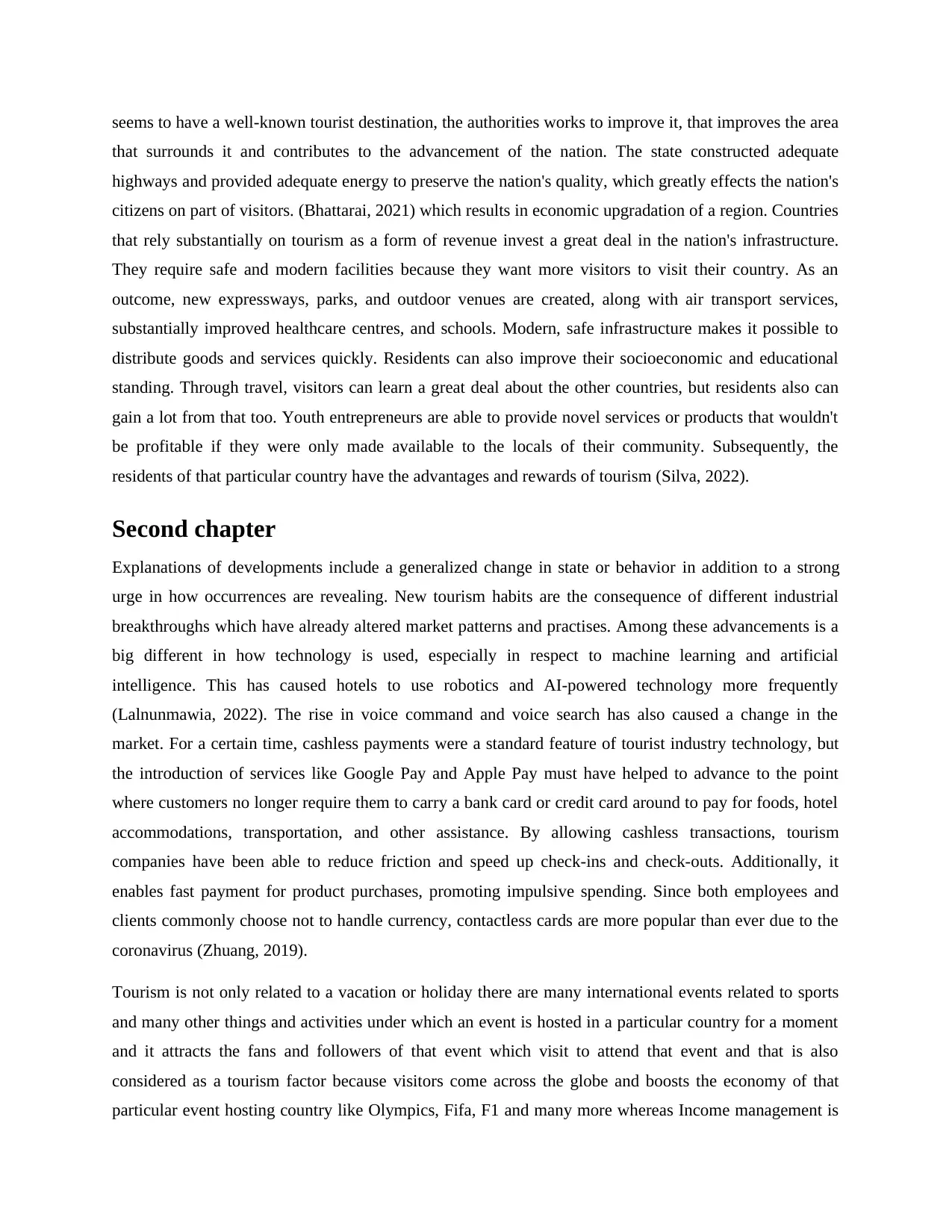
seems to have a well-known tourist destination, the authorities works to improve it, that improves the area
that surrounds it and contributes to the advancement of the nation. The state constructed adequate
highways and provided adequate energy to preserve the nation's quality, which greatly effects the nation's
citizens on part of visitors. (Bhattarai, 2021) which results in economic upgradation of a region. Countries
that rely substantially on tourism as a form of revenue invest a great deal in the nation's infrastructure.
They require safe and modern facilities because they want more visitors to visit their country. As an
outcome, new expressways, parks, and outdoor venues are created, along with air transport services,
substantially improved healthcare centres, and schools. Modern, safe infrastructure makes it possible to
distribute goods and services quickly. Residents can also improve their socioeconomic and educational
standing. Through travel, visitors can learn a great deal about the other countries, but residents also can
gain a lot from that too. Youth entrepreneurs are able to provide novel services or products that wouldn't
be profitable if they were only made available to the locals of their community. Subsequently, the
residents of that particular country have the advantages and rewards of tourism (Silva, 2022).
Second chapter
Explanations of developments include a generalized change in state or behavior in addition to a strong
urge in how occurrences are revealing. New tourism habits are the consequence of different industrial
breakthroughs which have already altered market patterns and practises. Among these advancements is a
big different in how technology is used, especially in respect to machine learning and artificial
intelligence. This has caused hotels to use robotics and AI-powered technology more frequently
(Lalnunmawia, 2022). The rise in voice command and voice search has also caused a change in the
market. For a certain time, cashless payments were a standard feature of tourist industry technology, but
the introduction of services like Google Pay and Apple Pay must have helped to advance to the point
where customers no longer require them to carry a bank card or credit card around to pay for foods, hotel
accommodations, transportation, and other assistance. By allowing cashless transactions, tourism
companies have been able to reduce friction and speed up check-ins and check-outs. Additionally, it
enables fast payment for product purchases, promoting impulsive spending. Since both employees and
clients commonly choose not to handle currency, contactless cards are more popular than ever due to the
coronavirus (Zhuang, 2019).
Tourism is not only related to a vacation or holiday there are many international events related to sports
and many other things and activities under which an event is hosted in a particular country for a moment
and it attracts the fans and followers of that event which visit to attend that event and that is also
considered as a tourism factor because visitors come across the globe and boosts the economy of that
particular event hosting country like Olympics, Fifa, F1 and many more whereas Income management is
that surrounds it and contributes to the advancement of the nation. The state constructed adequate
highways and provided adequate energy to preserve the nation's quality, which greatly effects the nation's
citizens on part of visitors. (Bhattarai, 2021) which results in economic upgradation of a region. Countries
that rely substantially on tourism as a form of revenue invest a great deal in the nation's infrastructure.
They require safe and modern facilities because they want more visitors to visit their country. As an
outcome, new expressways, parks, and outdoor venues are created, along with air transport services,
substantially improved healthcare centres, and schools. Modern, safe infrastructure makes it possible to
distribute goods and services quickly. Residents can also improve their socioeconomic and educational
standing. Through travel, visitors can learn a great deal about the other countries, but residents also can
gain a lot from that too. Youth entrepreneurs are able to provide novel services or products that wouldn't
be profitable if they were only made available to the locals of their community. Subsequently, the
residents of that particular country have the advantages and rewards of tourism (Silva, 2022).
Second chapter
Explanations of developments include a generalized change in state or behavior in addition to a strong
urge in how occurrences are revealing. New tourism habits are the consequence of different industrial
breakthroughs which have already altered market patterns and practises. Among these advancements is a
big different in how technology is used, especially in respect to machine learning and artificial
intelligence. This has caused hotels to use robotics and AI-powered technology more frequently
(Lalnunmawia, 2022). The rise in voice command and voice search has also caused a change in the
market. For a certain time, cashless payments were a standard feature of tourist industry technology, but
the introduction of services like Google Pay and Apple Pay must have helped to advance to the point
where customers no longer require them to carry a bank card or credit card around to pay for foods, hotel
accommodations, transportation, and other assistance. By allowing cashless transactions, tourism
companies have been able to reduce friction and speed up check-ins and check-outs. Additionally, it
enables fast payment for product purchases, promoting impulsive spending. Since both employees and
clients commonly choose not to handle currency, contactless cards are more popular than ever due to the
coronavirus (Zhuang, 2019).
Tourism is not only related to a vacation or holiday there are many international events related to sports
and many other things and activities under which an event is hosted in a particular country for a moment
and it attracts the fans and followers of that event which visit to attend that event and that is also
considered as a tourism factor because visitors come across the globe and boosts the economy of that
particular event hosting country like Olympics, Fifa, F1 and many more whereas Income management is
⊘ This is a preview!⊘
Do you want full access?
Subscribe today to unlock all pages.

Trusted by 1+ million students worldwide
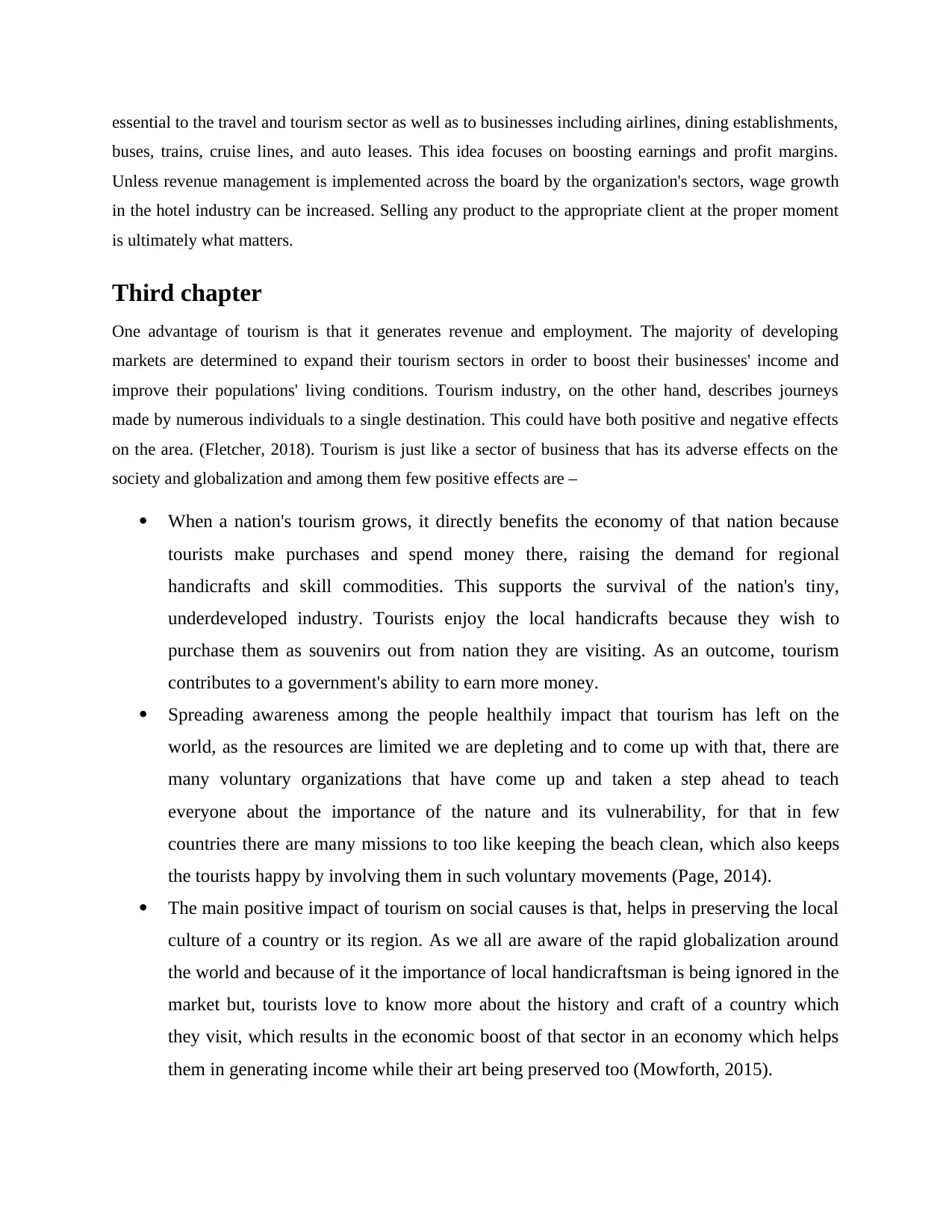
essential to the travel and tourism sector as well as to businesses including airlines, dining establishments,
buses, trains, cruise lines, and auto leases. This idea focuses on boosting earnings and profit margins.
Unless revenue management is implemented across the board by the organization's sectors, wage growth
in the hotel industry can be increased. Selling any product to the appropriate client at the proper moment
is ultimately what matters.
Third chapter
One advantage of tourism is that it generates revenue and employment. The majority of developing
markets are determined to expand their tourism sectors in order to boost their businesses' income and
improve their populations' living conditions. Tourism industry, on the other hand, describes journeys
made by numerous individuals to a single destination. This could have both positive and negative effects
on the area. (Fletcher, 2018). Tourism is just like a sector of business that has its adverse effects on the
society and globalization and among them few positive effects are –
When a nation's tourism grows, it directly benefits the economy of that nation because
tourists make purchases and spend money there, raising the demand for regional
handicrafts and skill commodities. This supports the survival of the nation's tiny,
underdeveloped industry. Tourists enjoy the local handicrafts because they wish to
purchase them as souvenirs out from nation they are visiting. As an outcome, tourism
contributes to a government's ability to earn more money.
Spreading awareness among the people healthily impact that tourism has left on the
world, as the resources are limited we are depleting and to come up with that, there are
many voluntary organizations that have come up and taken a step ahead to teach
everyone about the importance of the nature and its vulnerability, for that in few
countries there are many missions to too like keeping the beach clean, which also keeps
the tourists happy by involving them in such voluntary movements (Page, 2014).
The main positive impact of tourism on social causes is that, helps in preserving the local
culture of a country or its region. As we all are aware of the rapid globalization around
the world and because of it the importance of local handicraftsman is being ignored in the
market but, tourists love to know more about the history and craft of a country which
they visit, which results in the economic boost of that sector in an economy which helps
them in generating income while their art being preserved too (Mowforth, 2015).
buses, trains, cruise lines, and auto leases. This idea focuses on boosting earnings and profit margins.
Unless revenue management is implemented across the board by the organization's sectors, wage growth
in the hotel industry can be increased. Selling any product to the appropriate client at the proper moment
is ultimately what matters.
Third chapter
One advantage of tourism is that it generates revenue and employment. The majority of developing
markets are determined to expand their tourism sectors in order to boost their businesses' income and
improve their populations' living conditions. Tourism industry, on the other hand, describes journeys
made by numerous individuals to a single destination. This could have both positive and negative effects
on the area. (Fletcher, 2018). Tourism is just like a sector of business that has its adverse effects on the
society and globalization and among them few positive effects are –
When a nation's tourism grows, it directly benefits the economy of that nation because
tourists make purchases and spend money there, raising the demand for regional
handicrafts and skill commodities. This supports the survival of the nation's tiny,
underdeveloped industry. Tourists enjoy the local handicrafts because they wish to
purchase them as souvenirs out from nation they are visiting. As an outcome, tourism
contributes to a government's ability to earn more money.
Spreading awareness among the people healthily impact that tourism has left on the
world, as the resources are limited we are depleting and to come up with that, there are
many voluntary organizations that have come up and taken a step ahead to teach
everyone about the importance of the nature and its vulnerability, for that in few
countries there are many missions to too like keeping the beach clean, which also keeps
the tourists happy by involving them in such voluntary movements (Page, 2014).
The main positive impact of tourism on social causes is that, helps in preserving the local
culture of a country or its region. As we all are aware of the rapid globalization around
the world and because of it the importance of local handicraftsman is being ignored in the
market but, tourists love to know more about the history and craft of a country which
they visit, which results in the economic boost of that sector in an economy which helps
them in generating income while their art being preserved too (Mowforth, 2015).
Paraphrase This Document
Need a fresh take? Get an instant paraphrase of this document with our AI Paraphraser
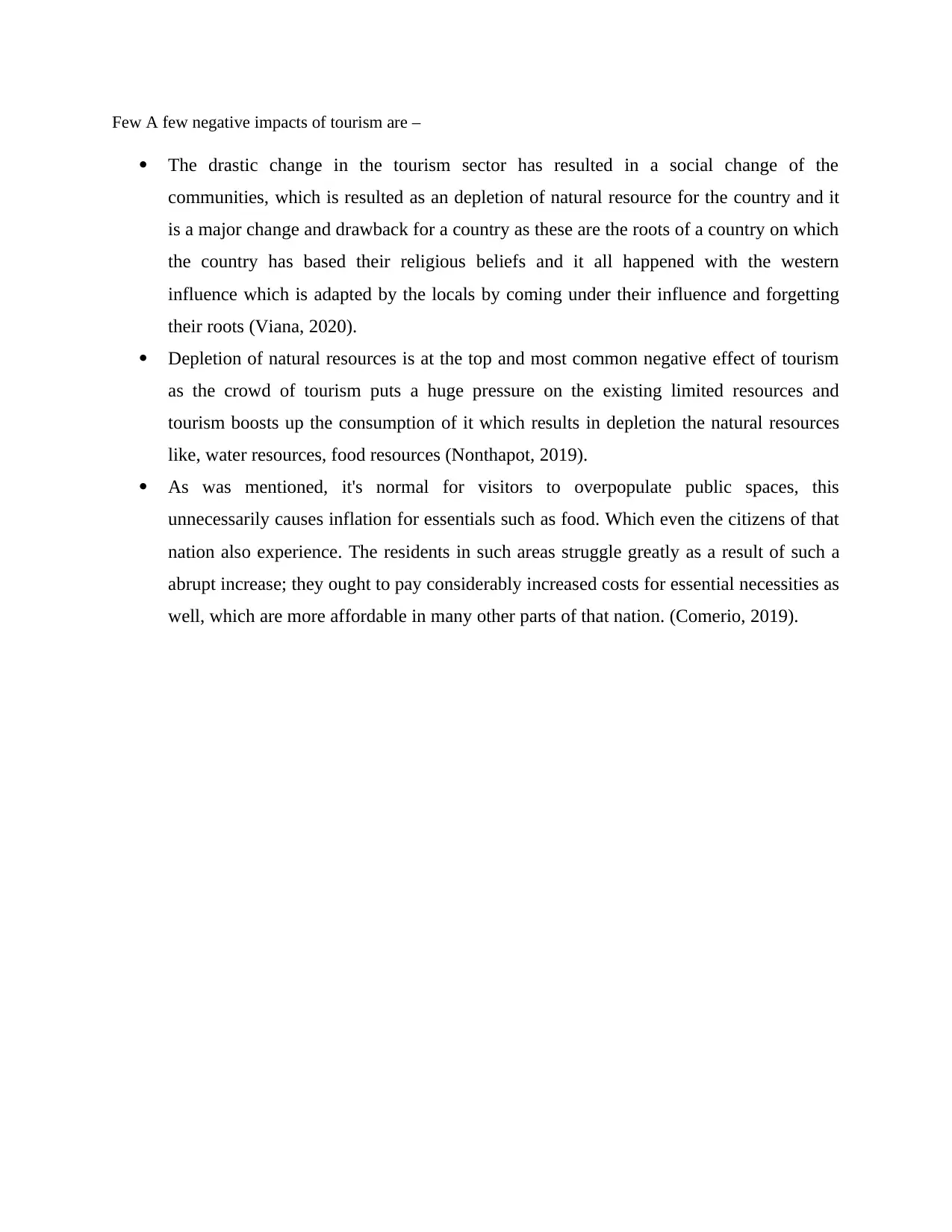
Few A few negative impacts of tourism are –
The drastic change in the tourism sector has resulted in a social change of the
communities, which is resulted as an depletion of natural resource for the country and it
is a major change and drawback for a country as these are the roots of a country on which
the country has based their religious beliefs and it all happened with the western
influence which is adapted by the locals by coming under their influence and forgetting
their roots (Viana, 2020).
Depletion of natural resources is at the top and most common negative effect of tourism
as the crowd of tourism puts a huge pressure on the existing limited resources and
tourism boosts up the consumption of it which results in depletion the natural resources
like, water resources, food resources (Nonthapot, 2019).
As was mentioned, it's normal for visitors to overpopulate public spaces, this
unnecessarily causes inflation for essentials such as food. Which even the citizens of that
nation also experience. The residents in such areas struggle greatly as a result of such a
abrupt increase; they ought to pay considerably increased costs for essential necessities as
well, which are more affordable in many other parts of that nation. (Comerio, 2019).
The drastic change in the tourism sector has resulted in a social change of the
communities, which is resulted as an depletion of natural resource for the country and it
is a major change and drawback for a country as these are the roots of a country on which
the country has based their religious beliefs and it all happened with the western
influence which is adapted by the locals by coming under their influence and forgetting
their roots (Viana, 2020).
Depletion of natural resources is at the top and most common negative effect of tourism
as the crowd of tourism puts a huge pressure on the existing limited resources and
tourism boosts up the consumption of it which results in depletion the natural resources
like, water resources, food resources (Nonthapot, 2019).
As was mentioned, it's normal for visitors to overpopulate public spaces, this
unnecessarily causes inflation for essentials such as food. Which even the citizens of that
nation also experience. The residents in such areas struggle greatly as a result of such a
abrupt increase; they ought to pay considerably increased costs for essential necessities as
well, which are more affordable in many other parts of that nation. (Comerio, 2019).
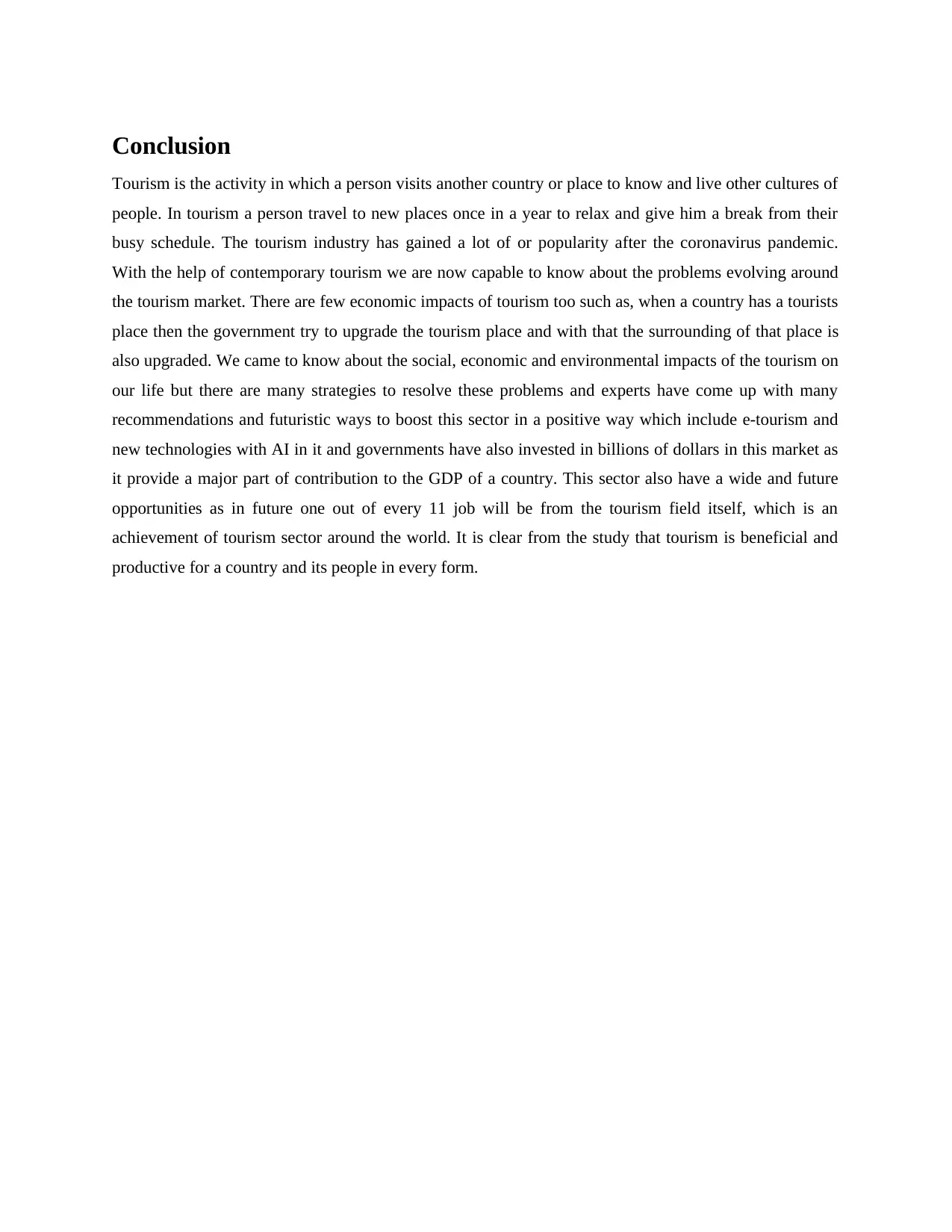
Conclusion
Tourism is the activity in which a person visits another country or place to know and live other cultures of
people. In tourism a person travel to new places once in a year to relax and give him a break from their
busy schedule. The tourism industry has gained a lot of or popularity after the coronavirus pandemic.
With the help of contemporary tourism we are now capable to know about the problems evolving around
the tourism market. There are few economic impacts of tourism too such as, when a country has a tourists
place then the government try to upgrade the tourism place and with that the surrounding of that place is
also upgraded. We came to know about the social, economic and environmental impacts of the tourism on
our life but there are many strategies to resolve these problems and experts have come up with many
recommendations and futuristic ways to boost this sector in a positive way which include e-tourism and
new technologies with AI in it and governments have also invested in billions of dollars in this market as
it provide a major part of contribution to the GDP of a country. This sector also have a wide and future
opportunities as in future one out of every 11 job will be from the tourism field itself, which is an
achievement of tourism sector around the world. It is clear from the study that tourism is beneficial and
productive for a country and its people in every form.
Tourism is the activity in which a person visits another country or place to know and live other cultures of
people. In tourism a person travel to new places once in a year to relax and give him a break from their
busy schedule. The tourism industry has gained a lot of or popularity after the coronavirus pandemic.
With the help of contemporary tourism we are now capable to know about the problems evolving around
the tourism market. There are few economic impacts of tourism too such as, when a country has a tourists
place then the government try to upgrade the tourism place and with that the surrounding of that place is
also upgraded. We came to know about the social, economic and environmental impacts of the tourism on
our life but there are many strategies to resolve these problems and experts have come up with many
recommendations and futuristic ways to boost this sector in a positive way which include e-tourism and
new technologies with AI in it and governments have also invested in billions of dollars in this market as
it provide a major part of contribution to the GDP of a country. This sector also have a wide and future
opportunities as in future one out of every 11 job will be from the tourism field itself, which is an
achievement of tourism sector around the world. It is clear from the study that tourism is beneficial and
productive for a country and its people in every form.
⊘ This is a preview!⊘
Do you want full access?
Subscribe today to unlock all pages.

Trusted by 1+ million students worldwide
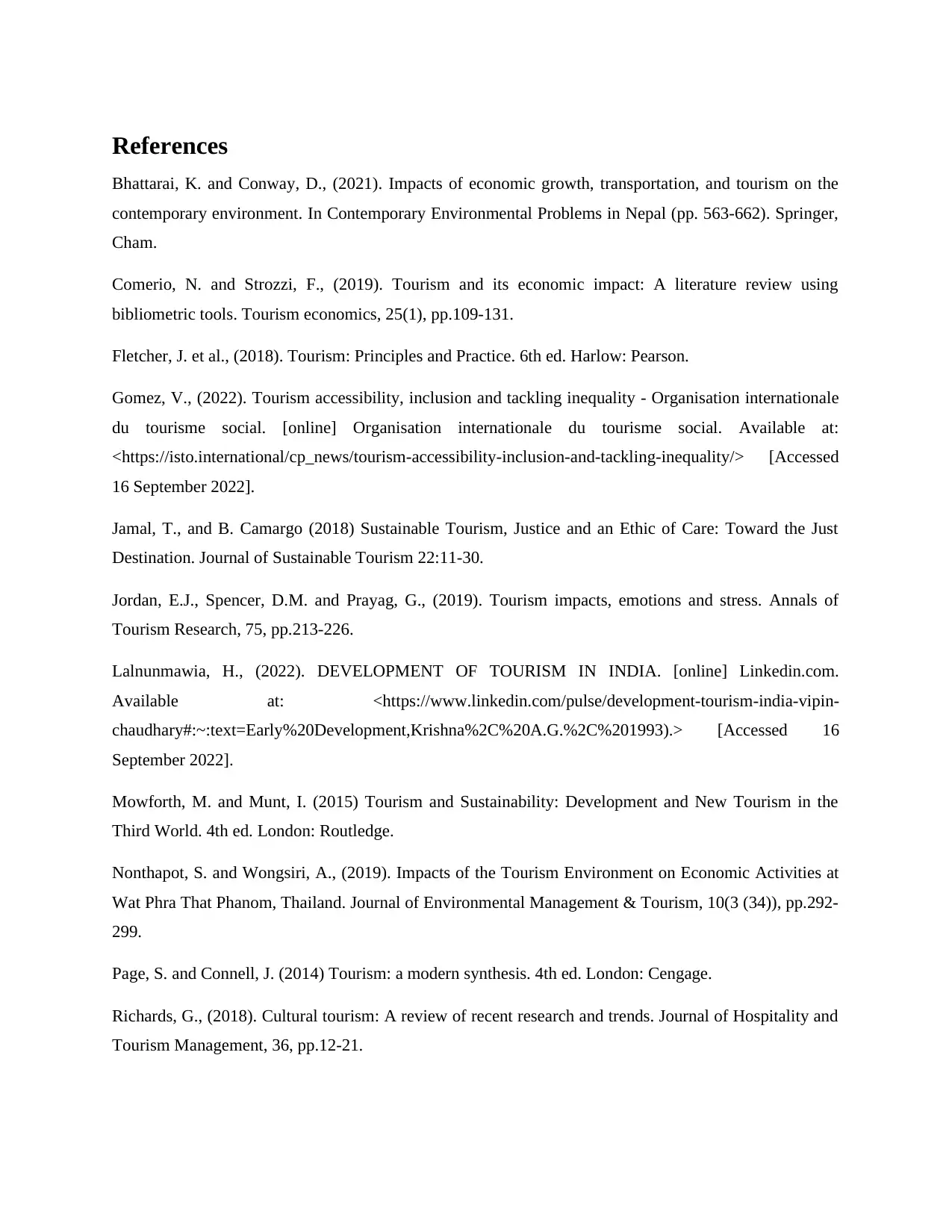
References
Bhattarai, K. and Conway, D., (2021). Impacts of economic growth, transportation, and tourism on the
contemporary environment. In Contemporary Environmental Problems in Nepal (pp. 563-662). Springer,
Cham.
Comerio, N. and Strozzi, F., (2019). Tourism and its economic impact: A literature review using
bibliometric tools. Tourism economics, 25(1), pp.109-131.
Fletcher, J. et al., (2018). Tourism: Principles and Practice. 6th ed. Harlow: Pearson.
Gomez, V., (2022). Tourism accessibility, inclusion and tackling inequality - Organisation internationale
du tourisme social. [online] Organisation internationale du tourisme social. Available at:
<https://isto.international/cp_news/tourism-accessibility-inclusion-and-tackling-inequality/> [Accessed
16 September 2022].
Jamal, T., and B. Camargo (2018) Sustainable Tourism, Justice and an Ethic of Care: Toward the Just
Destination. Journal of Sustainable Tourism 22:11-30.
Jordan, E.J., Spencer, D.M. and Prayag, G., (2019). Tourism impacts, emotions and stress. Annals of
Tourism Research, 75, pp.213-226.
Lalnunmawia, H., (2022). DEVELOPMENT OF TOURISM IN INDIA. [online] Linkedin.com.
Available at: <https://www.linkedin.com/pulse/development-tourism-india-vipin-
chaudhary#:~:text=Early%20Development,Krishna%2C%20A.G.%2C%201993).> [Accessed 16
September 2022].
Mowforth, M. and Munt, I. (2015) Tourism and Sustainability: Development and New Tourism in the
Third World. 4th ed. London: Routledge.
Nonthapot, S. and Wongsiri, A., (2019). Impacts of the Tourism Environment on Economic Activities at
Wat Phra That Phanom, Thailand. Journal of Environmental Management & Tourism, 10(3 (34)), pp.292-
299.
Page, S. and Connell, J. (2014) Tourism: a modern synthesis. 4th ed. London: Cengage.
Richards, G., (2018). Cultural tourism: A review of recent research and trends. Journal of Hospitality and
Tourism Management, 36, pp.12-21.
Bhattarai, K. and Conway, D., (2021). Impacts of economic growth, transportation, and tourism on the
contemporary environment. In Contemporary Environmental Problems in Nepal (pp. 563-662). Springer,
Cham.
Comerio, N. and Strozzi, F., (2019). Tourism and its economic impact: A literature review using
bibliometric tools. Tourism economics, 25(1), pp.109-131.
Fletcher, J. et al., (2018). Tourism: Principles and Practice. 6th ed. Harlow: Pearson.
Gomez, V., (2022). Tourism accessibility, inclusion and tackling inequality - Organisation internationale
du tourisme social. [online] Organisation internationale du tourisme social. Available at:
<https://isto.international/cp_news/tourism-accessibility-inclusion-and-tackling-inequality/> [Accessed
16 September 2022].
Jamal, T., and B. Camargo (2018) Sustainable Tourism, Justice and an Ethic of Care: Toward the Just
Destination. Journal of Sustainable Tourism 22:11-30.
Jordan, E.J., Spencer, D.M. and Prayag, G., (2019). Tourism impacts, emotions and stress. Annals of
Tourism Research, 75, pp.213-226.
Lalnunmawia, H., (2022). DEVELOPMENT OF TOURISM IN INDIA. [online] Linkedin.com.
Available at: <https://www.linkedin.com/pulse/development-tourism-india-vipin-
chaudhary#:~:text=Early%20Development,Krishna%2C%20A.G.%2C%201993).> [Accessed 16
September 2022].
Mowforth, M. and Munt, I. (2015) Tourism and Sustainability: Development and New Tourism in the
Third World. 4th ed. London: Routledge.
Nonthapot, S. and Wongsiri, A., (2019). Impacts of the Tourism Environment on Economic Activities at
Wat Phra That Phanom, Thailand. Journal of Environmental Management & Tourism, 10(3 (34)), pp.292-
299.
Page, S. and Connell, J. (2014) Tourism: a modern synthesis. 4th ed. London: Cengage.
Richards, G., (2018). Cultural tourism: A review of recent research and trends. Journal of Hospitality and
Tourism Management, 36, pp.12-21.
Paraphrase This Document
Need a fresh take? Get an instant paraphrase of this document with our AI Paraphraser
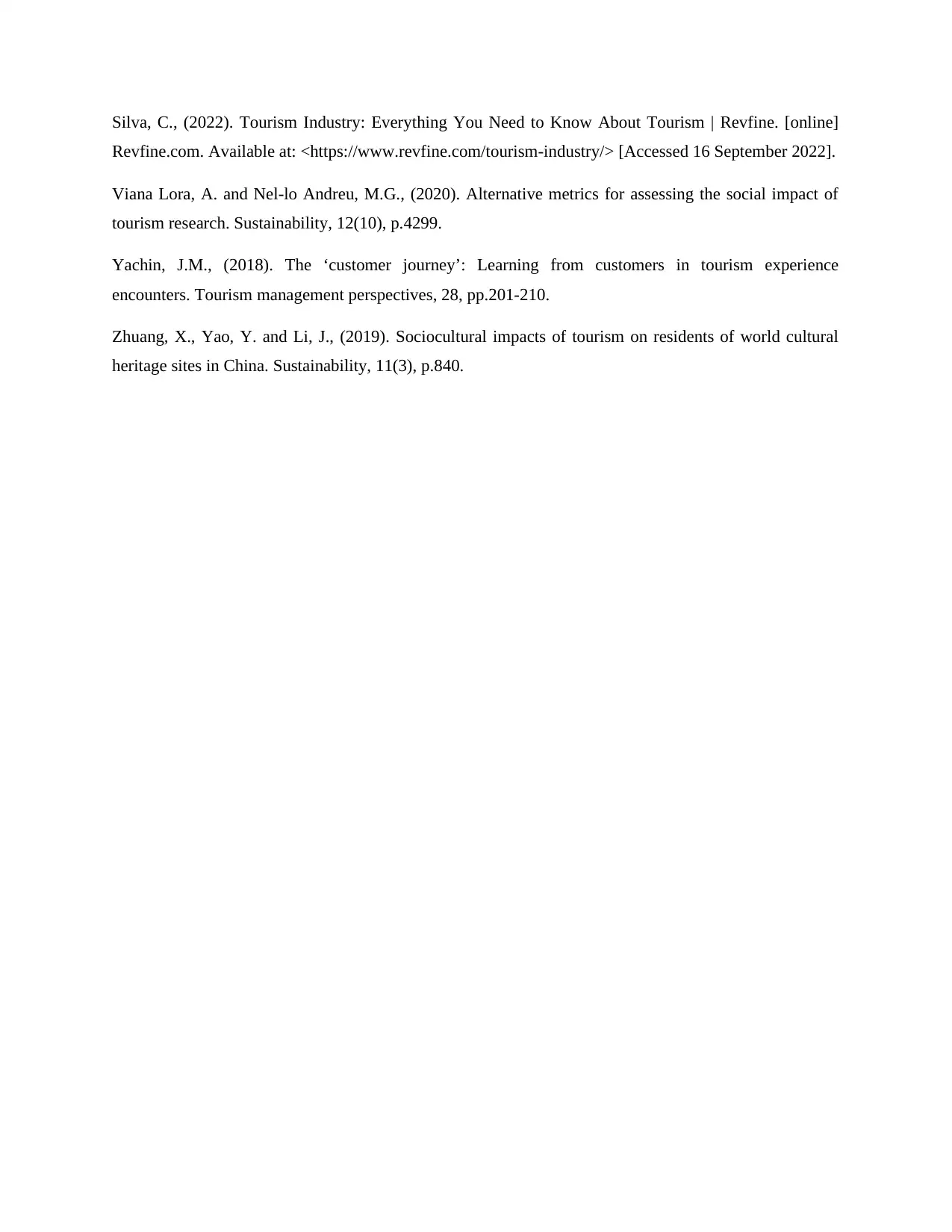
Silva, C., (2022). Tourism Industry: Everything You Need to Know About Tourism | Revfine. [online]
Revfine.com. Available at: <https://www.revfine.com/tourism-industry/> [Accessed 16 September 2022].
Viana Lora, A. and Nel-lo Andreu, M.G., (2020). Alternative metrics for assessing the social impact of
tourism research. Sustainability, 12(10), p.4299.
Yachin, J.M., (2018). The ‘customer journey’: Learning from customers in tourism experience
encounters. Tourism management perspectives, 28, pp.201-210.
Zhuang, X., Yao, Y. and Li, J., (2019). Sociocultural impacts of tourism on residents of world cultural
heritage sites in China. Sustainability, 11(3), p.840.
Revfine.com. Available at: <https://www.revfine.com/tourism-industry/> [Accessed 16 September 2022].
Viana Lora, A. and Nel-lo Andreu, M.G., (2020). Alternative metrics for assessing the social impact of
tourism research. Sustainability, 12(10), p.4299.
Yachin, J.M., (2018). The ‘customer journey’: Learning from customers in tourism experience
encounters. Tourism management perspectives, 28, pp.201-210.
Zhuang, X., Yao, Y. and Li, J., (2019). Sociocultural impacts of tourism on residents of world cultural
heritage sites in China. Sustainability, 11(3), p.840.
1 out of 8
Related Documents
Your All-in-One AI-Powered Toolkit for Academic Success.
+13062052269
info@desklib.com
Available 24*7 on WhatsApp / Email
![[object Object]](/_next/static/media/star-bottom.7253800d.svg)
Unlock your academic potential
Copyright © 2020–2025 A2Z Services. All Rights Reserved. Developed and managed by ZUCOL.

